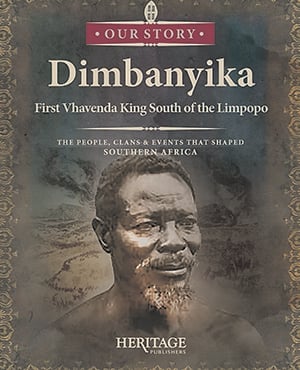
Dimbanyika: First Vhavenda King South of the Limpopo
South African Heritage Publishers
48 pages, illustrated
R100 at bookstores
Leopard hunted in the forests and on the plateaus of the mountain. Porcupine and wild pigs foraged below while butterflies, beetles and bees flew above.
Monkeys and baboons swung through the trees, and rock rabbits soaked up the sun on the rocky outcrops. Dimbanyika loved hunting and regularly took with him his dogs, Matshena and Mazwipalile.
One fateful day, he set off with his faithful companions, perhaps hoping to catch a couple of fat rock rabbits for the pot.
By nightfall, the dogs returned, whining, to the village at the top of the mountain without their master. Of course the villagers were worried, but nothing could be done in the dark. They would go in the morning and find their king.
With first light, a search party set off with one of Dimbanyika’s dogs. The king’s dog led the way around the mountain to a cave where it stopped, whimpering and swinging its tail.
The entrance to the cave was blocked by huge boulders, which the men tried to remove. One by one, then together, they put their shoulders to the rocks, but it was impossible to move them. Suddenly, a voice called out from inside the cave.
It was that of Dimbanyika! “Men, there is nothing to be done except to leave me here,” he said. “This cave will be my dying place and my grave. The mountain will be the sign of my grave.”
At first astonished and not a little fearful at hearing the voice from within the cave, the elders drew near to receive detailed instructions from their king.
According to these, they could not stay at the village any longer, they had to move. But the son of the uncle of Dimbanyika, Mbwapenga, was to stay and tend the grave.
He would also be the keeper of the sacred drum, Ngoma Lungunda, which had to be kept near the grave. The son of Mbwapenga was also to be responsible for rain and good crops.
There was more from the voice of Dimbanyika, telling the people exactly what he wanted. They were to leave immediately, led by Nyamulanalwo.
The instruction was that she would look after Vele, who was still too young to succeed his father. Only the keepers of the grave and the sacred sites, the sons of Mbwapenga, could eat of the fruits, plants and honey from the mountain from that day onwards.
This is, indeed, a fantastic story and some say that the death of Dimbanyika was a lot less mysterious.
There was fighting among three of his sons, they say, and one of them trapped his father and brothers in a cave. The young men dug their way free, but left their father behind. Eventually, Phophi won the battle. He was declared the winner of the young men.
Another, more modern tradition says that Dimbanyika had placed his adult sons in charge of villages in the outlying areas.
Phophi, the eldest, was chief in Nzhelele, while Thishisebe ruled in Makonde, Tshivhase in Phiphidi and Bele in Vuba.
The story of the disappearing king who speaks from the cave is the one handed down by the descendants of Mbwapenga.
He was the maternal uncle of Dimbayika and the first known chief of the Vhasenzi in the early land of Venda.
Some time before his nephew arrived, he built the stone walls of his home on the southern slopes of the mountain, where its ruins can still be seen today. Soon after, Dimbanyika followed this vanguard with his followers.
After the death of Dimbanyika, the son of Mbwapenga became known as Netshiendeulu and Lwandali was called Tshiendeulu, which means cemetery.
The Ngoma Lungunda was taken to a cave near the grave of Dimbanyika, as instructed, and is kept safe there by the family of Netshiendeulu.
We will come back to this drum, tales of where it came from and the magic created by its powerful voice.
But for now, we will leave it in the sacred cave, where generations have not only kept it safe, but have restored it, time and again.
The Great Makhadzi did as she had been told and led the people to a fertile plain a few miles away on the southwest of the mountain.
Under her rule, as protector of the crown prince, round walls, passages, outer walls and entrances of stone were carefully built.
Higher and higher the walls rose till some towered above the tallest man.
Flat stones were used, placed one on the other without mortar, in the way of much of the building at Great Zimbabwe and Mapungubwe before that. Stone walls enclosed a khoro like the one at Dzata, with a stone seat built into them.
It was here that visitors would be received, or where the community would gather for ritual or dance.
Also, like Dimbanyika’s village, the stonework of the royal quarters was superior. The place was called Dzata and today its ruins are referred to as Dzata Tshiendeulu.
. To buy the book, ask your nearest bookseller to order a copy if they do not stock the series, or contact the publishers at info@saheritagepublishers.co.za
. For a full list of titles in the series, visit saheritagepublishers.co.za
. For updates and more information, follow Our Story at facebook.com/ancestorstories or on Twitter at @saheritagepub
WIN!
To win an exclusive box set of the first 14 Our Story books, valued at R2 500, SMS us on 34217 using the keyword HERITAGE8. Include your name, surname, email address and the answer to the following question:
What was the sacred drum called?
Congratulations to last week’s winner, Pabalelo Mabilo from Burgersfort (ANSWER: White ox)




 Publications
Publications
 Partners
Partners






















